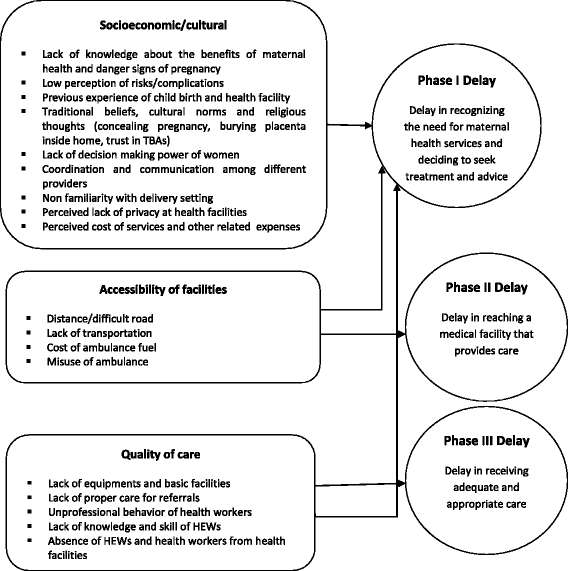Exploring barriers to the use of formal maternal health services and priority areas for action in Sidama zone, southern Ethiopia
- PMID: 29649972
- PMCID: PMC5897996
- DOI: 10.1186/s12884-018-1721-5
Exploring barriers to the use of formal maternal health services and priority areas for action in Sidama zone, southern Ethiopia
Abstract
Background: In 2015 the maternal mortality ratio for Ethiopia was 353 per 100,000 live births. Large numbers of women do not use maternal health services. This study aimed to identify factors influencing the use of maternal health services at the primary health care unit (PHCU) level in rural communities in Sidama zone, south Ethiopia in order to design quality improvement interventions.
Methods: We conducted a qualitative study in six woredas in 2013: 14 focus group discussions (FGDs) and 44 in-depth interviews with purposefully selected community members (women, male, traditional birth attendants, local kebele administrators), health professionals and health extension workers (HEWs) at PHCUs. We digitally recorded, transcribed and thematically analysed the interviews and FGDs using Nvivo. The 'three delay model' informed the analytical process and discussion of barriers to the use of maternal health services.
Results: Lack of knowledge on danger signs and benefits of maternal health services; cultural and traditional beliefs; trust in TBAs; lack of decision making power of women, previous negative experiences with health facilities; fear of going to an unfamiliar setting; lack of privacy and perceived costs of maternal health services were the main factors causing the first delay in deciding to seek care. Transport problems in inaccessible areas were the main contributing factor for the second delay on reaching care facilities. Lack of logistic supplies and equipment, insufficient knowledge and skills and unprofessional behaviour of health workers were key factors for the third delay in accessing quality care.
Conclusions: Use of maternal health services at the PHCU level in Sidama zone is influenced by complex factors within the community and health system. PHCUs should continue to implement awareness creation activities to improve knowledge of the community on complications of pregnancy and benefits of maternal health services. The health system has to be responsive to community's cultural norms and practices. The mangers of the woreda health office and health centres should take into account the available budgets; work on ensuring the necessary logistics and supplies to be in place at PHCU.
Keywords: Ethiopia; Health extension workers; Maternal health; Quality improvement; Service utilization; Three delays.
Conflict of interest statement
Ethics approval and consent to participate
The generic study protocol was approved by the Royal Tropical Institute Ethical Review Committee in Amsterdam. National approval was obtained from Research and Technology Transfer Core Process of South Nation Nationalities and Peoples Region Health Bureau, Ethiopia (
The ethics committee approved to obtain informed verbal consent from illiterate participants and hence we sought informed verbal consent from mothers, TBAs and male participants. Written informed consent was obtained from
Competing interests
The authors declare that they have no competing interests.
Publisher’s Note
Springer Nature remains neutral with regard to jurisdictional claims in published maps and institutional affiliations.
Figures
References
-
- WHO, UNICEF, UNFPA, World Bank . Trends in maternal mortality 1990–2015, Geneva Switherland. 2015.
-
- Thaddeus S, Maine D. Too far to walk: maternal mortality in context. Soc Sci Med. 1994;38(8):1091-110. - PubMed
-
- Ellis C, Schummers L, Rostoker J-F. Reducing maternal mortality in Uganda: applying the “three delays” framework. Int J Child Birth. 2011;1(4):218–226. doi: 10.1891/2156-5287.1.4.218. - DOI
-
- Shah N, Hossain N, Shoaib R, Hussain A, Gillani R, Khan NH. Socio-demographic characteristics and the three delays of maternal mortality. J Coll Physicians Surg Pak. 2009;19(2):95–98. - PubMed
-
- Thiri Win, Patama Vapattanawong, Vong-ek P. Three delays related to maternal mortality in Myanmar: a case study from maternal death review, 2013. J Health Res. 2015;29(3):179–87.
Publication types
MeSH terms
Grants and funding
LinkOut - more resources
Full Text Sources
Other Literature Sources
Medical


